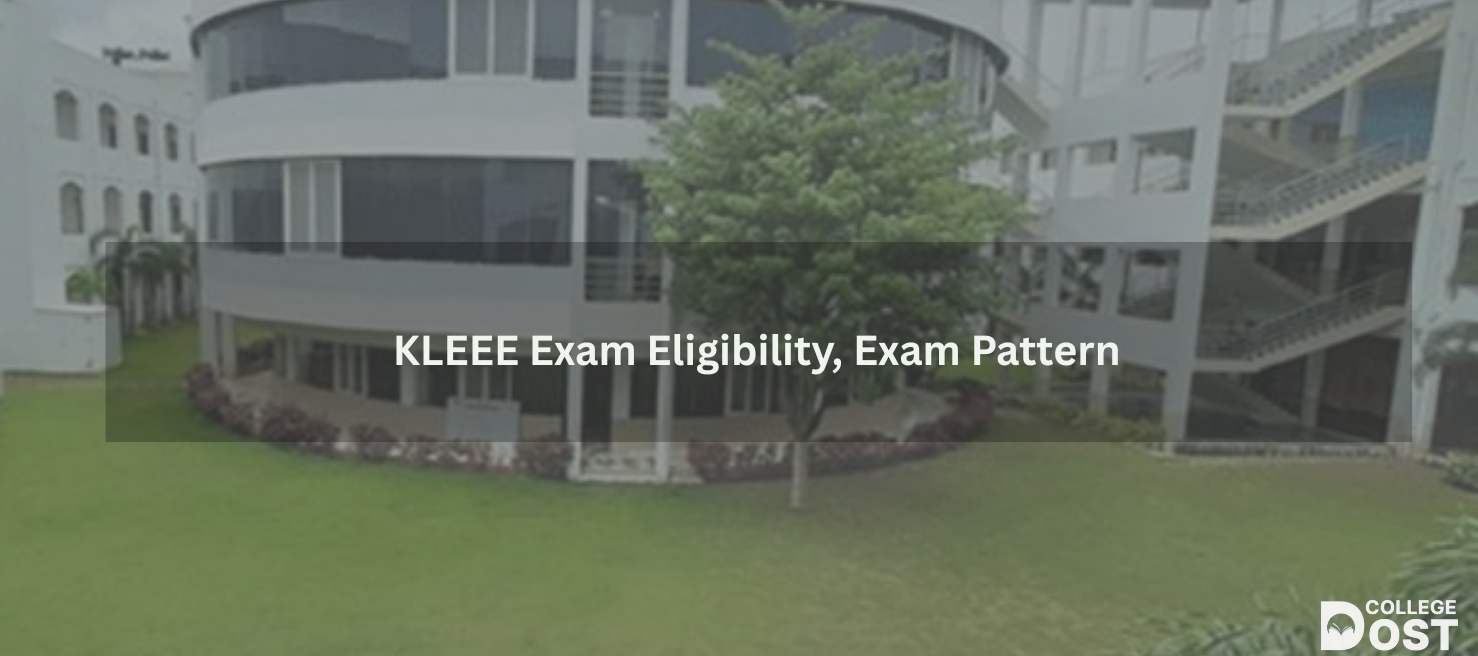
The KLEEE (KL Engineering Entrance Examination) is an entrance exam conducted by KL University (Koneru Lakshmaiah Education Foundation) for admission to various undergraduate and postgraduate engineering courses. For admission to the BTech program at KL University, candidates need to qualify for the Koneru Lakshmaiah Engineering Entrance Examination. The exam is an online Computer Based Test (CBT), which is conducted for 3 hours. There are 75 MCQ-type questions. 1 mark will be awarded for each question, and there are no negative marks for the incorrect answer.
Candidates need to have 60% marks in the 10+2 level with Physics, Chemistry, and Mathematics (PCM) as the main subjects to be eligible for the KLEEE. The application is available in online mode. Candidates need to pay INR 1000 to register for KLEEE.
KLEEE Exam Eligibility
The entrance exam accepted by KL University for admission to the BTech course is KLEEE. To be eligible to apply for the KLEEE, candidates must meet the eligibility requirements given below:
Nationality: The candidate must be a Citizen of India. However, Foreign Nationals are also eligible to apply based on specific guidelines laid out by the university.
Educational Qualifications: For B.Tech/B.E. (Undergraduate Courses):
Minimum Qualification: The candidate must have passed or appeared for the 10+2 (or equivalent) examination with Physics, Chemistry, and Mathematics as compulsory subjects.
Minimum Marks: A candidate must have secured at least 60% aggregate marks in Physics, Chemistry, and Mathematics (PCM) in the qualifying exam.
For B.Tech (Lateral Entry):
Minimum Qualification: Candidates should have completed a Diploma in Engineering with a minimum of 60% marks and must have a valid lateral entry.
Age Limit: The candidate should be at least 17 years old on the 31st of December of the year of admission.
Specific Criteria for Different Courses: For some specialized courses like Aerospace Engineering or Civil Engineering, the university may have specific criteria, so it is recommended to check the official brochure for detailed eligibility information.
KLEEE Exam Pattern
The KLEEE exam is conducted online (computer-based test). Candidates will have to take the exam from designated exam centers to apply for KL University admission 2025.
Understanding the exam pattern is essential for effective preparation. The KLEEE exam is designed to assess a candidate’s knowledge in various subjects related to engineering.
| Particulars | Details |
| Mode of Exam | Computer-Based Mode and Pen-and-Paper-Based Mode |
| Duration | 3 Hours |
| Sections | Mathematics Chemistry Physics |
| Type of Questions | Multiple Choice Questions |
| Total Number of Questions | 75 QuestionsMathematics – 25 questionsChemistry – 25 questionsPhysics – 25 questions |
| Marking Scheme | For every correct answer, one mark will be allotted. There will be no negative marking. |
KLEEE Syllabus
The KLEEE syllabus is mainly based on the CBSE 11th and 12th standard syllabus for B.Tech and B.E. courses, and the topics will align closely with the subjects studied in school. For M.Tech, the syllabus will be more related to your undergraduate engineering course.
The KLEEE syllabus is divided into three major subjects:
- Physics
- Chemistry
- Mathematics
1. Physics Syllabus for KLEEE
Physics is a key subject in the KLEEE exam, and it tests your understanding of concepts related to the physical world, forces, energy, and motion. The topics generally align with the Class 11 and 12 curriculum.
| Physics Topics | |
| Topics of Class 11 | Topics of Class 12 |
| Physical World and Measurement | Electrostatics |
| Kinematics | Current Electricity |
| Laws of Motion | Magnetic Effects of Current and Magnetism |
| Work, Energy, and Power | Electromagnetic Induction and Alternating Currents |
| Motion of System of Particles and Rigid Body | Electromagnetic Waves |
| Gravitation | Optics |
| Properties of Bulk Matter | Dual Nature of Matter and Radiation |
| Thermodynamics | Atoms and Nuclei |
| Behavior of Perfect Gas and Kinetic Theory | Electronic Devices |
| Oscillations and Waves | – |
2. Chemistry Syllabus for KLEEE
Chemistry is another vital subject for KLEEE, assessing your understanding of chemical reactions, molecular structures, and the principles that govern chemical processes. The syllabus includes both organic and inorganic chemistry, as well as physical chemistry.
| Chemistry Topics | |
| Topics of Class 11 | Topics of Class 12 |
| Some Basic Concepts of Chemistry | Solid State |
| Structure of Atom | Solutions |
| Classification of Elements and Periodicity in Properties | Electrochemistry |
| Chemical Bonding and Molecular Structure | Chemical Kinetics |
| States of Matter: Gases and Liquids | Surface Chemistry |
| Thermodynamics | General Principles and Processes of Isolation of Elements |
| Equilibrium | p-Block Elements |
| Redox Reactions | d- and f-Block Elements |
| Hydrogen | Coordination Compounds |
| s-Block Elements (Alkali and Alkaline Earth Metals) | Haloalkanes and Haloarenes |
| Some p-Block Elements | Alcohols, Phenols, and Ethers |
| Organic Chemistry – Some Basic Principles and Techniques | Aldehydes, Ketones, and Carboxylic Acids |
| Hydrocarbons | Organic Compounds Containing Nitrogen |
| Environmental Chemistry | Biomolecules |
| – | Polymers |
| – | Chemistry in Everyday Life |
3. Mathematics Syllabus for KLEEE
Mathematics is a core subject for students aspiring to pursue a career in engineering. The KLEEE exam tests your problem-solving skills and your understanding of algebra, calculus, geometry, and other mathematical concepts.
| Mathematics Topics | |
| Topics of Class 11 | Topics of Class 12 |
| Sets, Relations, and Functions | Matrices and Determinants |
| Algebra | Indeterminate Forms |
| Polynomials | Sequences and Series |
| Linear Inequalities | Continuity and Differentiability |
| Permutations and Combinations | Applications of Derivatives |
| Binomial Theorem | Integrals and Differential Equations |
| Coordinate Geometry | Vectors and 3D Geometry |
| Straight Lines | Linear Programming |
| Conic Sections (Circles, Parabolas, Ellipses, Hyperbolas) | Sets, Relations, and Functions |
| Calculus | Algebra |
| Limits and Derivatives | Calculus |
| Mathematical Reasoning | Statistics and Probability |
| Statistics and Probability | – |
| Trigonometry | – |
| Trigonometric Functions | – |
| Trigonometric Equations | – |
| Properties of Triangles | – |
Also Read: KL University Scholarship 2025
How to Prepare for the KLEEE Exam?
1. Understand the Syllabus Thoroughly
- Go through the entire syllabus for KLEEE and break it down by subject. Identify key areas to focus on, especially areas where you feel less confident.
2. Solve Previous Year Papers
- Solving previous years’ question papers will help you understand the pattern and difficulty level of the exam. It will also help you manage your time during the exam.
3. Practice Regularly
- Regular practice is the key to success. Practice solving MCQs, focus on speed and accuracy, and take timed mock tests.
4. Focus on Important Topics
Concentrate on high-weightage topics such as Mechanics, Optics, Algebra, and Calculus for B.Tech aspirants. For M.Tech aspirants, focus on key subjects in your specialization.
Frequently Asked Questions
1. What is the difficulty level of KLEEE?
The difficulty of KLEEE is JEE level. Candidates need to prepare it thoroughly and practice enough mock tests to qualify for this examination.
2. What is the registration fee for KLEEE?
The registration fee for KLEEE is INR 1K.
3. What is the educational qualification for KLEEE?
The educational qualification for KLEEE is a minimum of 60% in the 10+2 level.
4. What is the KLEEE syllabus?
The KLEEE 2025 syllabus is based on the topics covered in class 11 and class 12. Candidates need to cover the syllabus of Physics, Chemistry, and Mathematics.
5. What is KLEEE, KLSAT, KLECET, KLHAT, KLMAT?
The full form of KLEEE is KL Engineering Entrance Examination, and KLSAT is KL Science Aptitude Test. However, for lateral admission, you need to qualify for KLECET, which is KL Engineering Common Entrance Test, and KLHAT, which is KL Humanities Aptitude Test. However, KLMAT is KL Management Admission Test,






